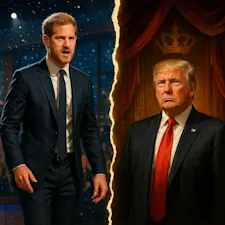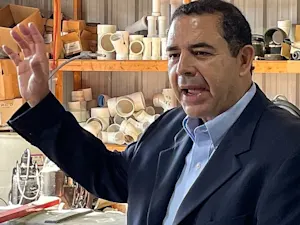
RFK Jr. Pledges Psychedelic Access in 12 Months
Robert F. Kennedy, Jr. speaking with supporters at a campaign rally at the Fox Tucson Theatre in Tucson, Arizona, 2024. Photo courtesy of Gage Skidmore under CC BY-SA 2.0.
When Robert F. Kennedy Jr. told Congress he wanted military veterans to access psychedelic therapy "within 12 months," as reported by POLITICO, jaws dropped — and not just on the left. In one sentence, the Health and Human Services Secretary under President Trump turned a decades-old taboo into a headline-grabbing mission.
Now, Kennedy is betting his reputation — and perhaps the Trump administration's, too — on mind-altering medicine as the key to ending the veterans' mental health crisis.
A Radical Shift in the War on PTSD
Kennedy's campaign is reportedly centered on legalizing therapies involving substances like MDMA and ibogaine, two powerful psychedelics that remain classified as Schedule I drugs under the Controlled Substances Act — meaning the federal government considers them to have no accepted medical use and a high potential for abuse.
His agency is coordinating with the Department of Veterans Affairs and the Food and Drug Administration to fast-track trials. Kennedy told Congress that there were, "11 clinical trials at the VA going on at this point—particularly for our service members and retired service members" according to GreenState.com.
He emphasized the need to act swiftly, adding that FDA Commissioner Marty Makary "told me that we don't want to wait two years to get this done," according to POLITICO.
The Unlikeliest Alliance: Republicans and Psychedelics
Once considered the purview of fringe liberals and counterculture rebels, psychedelic drugs now have an unexpected home in conservative circles — particularly among veterans and libertarian-leaning Republicans.
Texas Republican Representative Dan Crenshaw, a decorated Navy SEAL who lost an eye in Afghanistan, has long supported psychedelic research. "I've spent years supporting clinical trials to study the use of psychedelics to treat PTSD," Crenshaw told POLITICO. "It's been a long fight, and it's taken a lot of grit. I'm grateful Secretary Kennedy is taking this seriously — helping to mainstream what could be a groundbreaking shift in mental health."
Crenshaw has also criticized federal regulators for blocking access to alternative treatments, saying, "These technocrats think they know better. Their job is to say NO and support the status quo," according to POLITICO.
The Veterans' Desperation
Veterans have reportedly shown up in droves at public hearings to testify about traveling overseas — often to Mexico — to seek ibogaine treatments for PTSD and addiction that they say saved their lives. In the U.S., access to those therapies remains blocked due to drug scheduling laws.
"These heroes have gone to war to defend the land of the free, only to come home and be faced with inflexible, bureaucratic systems that offer ineffectual solutions, paired with the Controlled Substances Act that has forced them to flee the country that they have defended in order to access treatment in a foreign country," said W. Bryan Hubbard, director of the American Ibogaine Initiative, according to POLITICO.
Kennedy and Veterans Affairs Secretary Doug Collins have made this issue a priority. Collins reportedly said recently he's open to having the government provide vouchers to cover the cost of psychedelic therapy for veterans who receive services outside the VA.
The Scientific Caution
Still, the road is far from clear. Last year, the FDA rejected a bid by Lykos Therapeutics to market MDMA-assisted therapy for PTSD, reportedly citing insufficient data and concerns that the company's researchers were acting more like "evangelists than scientists," as reported by POLITICO.
FDA advisers reportedly flagged risks such as heart and liver damage from MDMA and ibogaine. They also questioned whether trial results were skewed by participants knowing whether they had received the active drug due to its "pronounced effects," according to POLITICO.
Kennedy has acknowledged those concerns. "It's critically important that we make sure that the science on this is solid," he said during the recent House hearing reported by GreenState.com. "The preliminary results are very, very encouraging, and it's something that we want to pursue."
A Personal Crusade
Kennedy's crusade is personal. He has spoken publicly about his teenage experience with LSD, which he initially described as "wonderful" — until it was followed by years of heroin addiction, according to GreenState.com. That lived experience apparently fuels his belief that psychedelics, when administered in controlled clinical settings, can be transformative.
He's also been sharply critical of how the FDA handled psychedelics in previous administrations, calling it part of a "war on public health" that he believes must end under the Trump administration, according to the MarijuanaMoment.net.
Racing Against the Clock
Kennedy's plan hinges on a 12-month window. He's made it clear that his team — along with FDA leadership — is racing to make psychedelic therapies legally available to veterans before the end of 2025.
With growing support from red-state lawmakers and unlikely champions in Trump's Cabinet, the initiative could mark a radical transformation in how the federal government treats mental illness — or it could collapse under the weight of skepticism and regulatory caution.
References: RFK Jr. is bringing psychedelics to the Republican Party | RFK Says Trump Administration Could Provide Psychedelic Therapy To Military Veterans 'Within 12 Months' | Major psychedelic reform could be coming soon






















